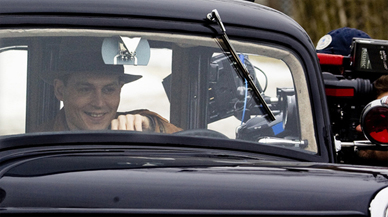Movie Review: Public Enemies
By Matthew Huntley
July 9, 2009
BoxOfficeProphets.com

That is why I was so surprised to find his latest, Public Enemies, merely average. It's good, sure, and it contains some very strong performances, but its assets don't fully disguise its problem areas.
The movie is a rather simple and straightforward tale about the capturing of America's most infamous gangsters of the 1930s, including John Dillinger, Baby Face Nelson and Pretty Boy Floyd. Dillinger is played by Johnny Depp, in another memorable performance where all the actor's previous characters are nowhere to be found. Depp fully embodies this historical figure and it would be irrelevant to question whether his acting is accurate based on Dillinger's real-life persona. The point is Depp creates a character who, despite being skinny and pale-skinned, displays a bold, confident attitude and an irresistible charm. Through Depp, we're convinced Dillinger was a born leader.
Chasing after Dillinger and the other gangsters is Melvin Purvis (Christian Bale), who has just become one of the leading agents in J. Edgar Hoover's newly formed Federal Bureau of Investigation. Bale is also well cast because he shows a lot of restraint with his role, yet he doesn't allow Depp to upstage him. He's quiet, but stern, and he doesn't play Purvis as a man willing to yield his integrity to criminals or his own boss. A thoughtful aspect of the screenplay is how it allows Purvis to admit he's not cut out for the job. About halfway through his manhunt, he asks Hoover (Billy Crudup, very effective) to send reinforcements to help bring these men down. Otherwise, more innocent men will be killed.
After Purvis catches Pretty Boy Floyd (Channing Tatum), the pressure builds on him to capture Dillinger and Nelson, who have justifiably earned reputations as the most ruthless and successful bank robbers in America. At one point, the FBI does catch Dillinger, but he manages to escape from the local prison. It won't be the first time he shows how easy breaking the law and getting away with it can be.
Like many crime lords in these stories, Dillinger has a lady friend. Her name is Billie Frechette (Marion Cotillard), whom he first notices across the room at a restaurant when meeting with other criminals. He quickly woos and falls in love with her, vowing to always protect her should she concede to loving him in return.
Unfortunately, John and Billie's relationship is like countless others we've seen in movies of this type, including Casino and American Gangster, right down to the cliché of the man giving his woman a fur coat. This was standard and nothing special. I felt their relationship served more as a plot and emotional device rather than a real development for these two characters.
The arc of the story is also nothing special. We follow Dillinger and Nelson (Stephen Graham) as they make their way from bank to bank, hide from authorities (often in plain, public sight) and engage in shootouts and car chases. All of these scenes are competently executed, and the shootouts are especially gripping because of their sound design and camera work, but we've seen these scenes dozens of times before. For the shootouts, Mann re-uses the same technique he always does — no music and mostly just bullets firing on the soundtrack. This is fast becoming his trademark (see Heat or Miami Vice).
As a narrative, the movie proceeds plainly and linearly from A to B without much style or inspiration. If Mann thinks his subject matter is enough to sell it, he's partially right — Dillinger is a rather fascinating character — but could he not think of a more interesting way to tell us about him? I never felt like Mann himself took a stance on the subject.
I also had a problem with Mann's decision to shoot the picture on high-definition video instead of film. He did the same for Collateral and Miami Vice, but those were modern-day action pictures. As a 1930s period piece, Public Enemies looks shallow and flat and we yearn for the classic, textured look of film and its rich depth of field. In the darker, more close-up shots, the images look cheap. We don't necessarily need an epic movie with grandiose wide shots, but there's an undeniable weight that film provides over video. Being such a historically mindful picture (the screenplay is adapted from Bryan Burrough's non-fiction novel), shooting on film would have been the better choice.
I recommend Public Enemies for its strong performances and for the intense, if stagy and over-the-top, action sequences. But it is only a marginal recommendation. Perhaps I hold Mann to too high a standard based on his previous efforts. With this movie, I wish he would have put a more dynamic spin on the genre by implementing a more challenging and unconventional perspective of the events instead of a straight, traditional adaptation. In the end, it's more or less just another crime drama. Because so many of these have already been made, I wanted it to be more.